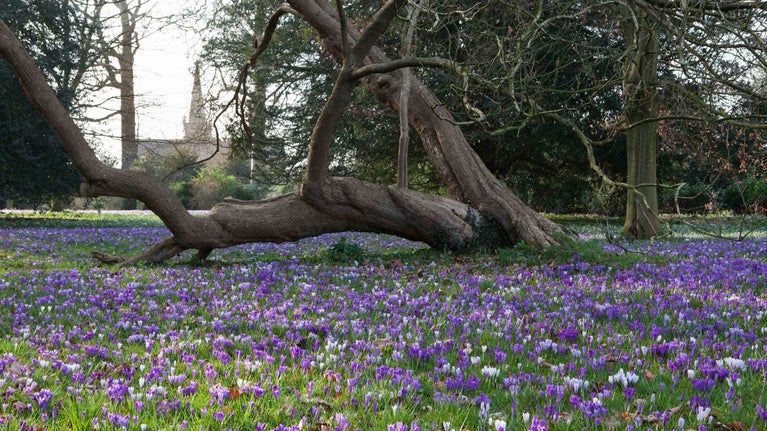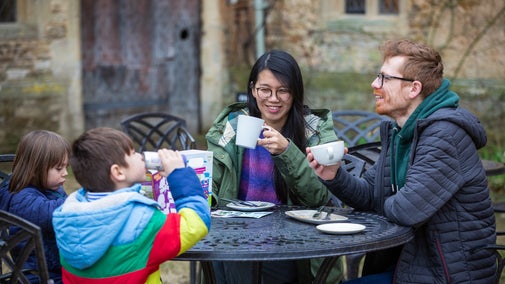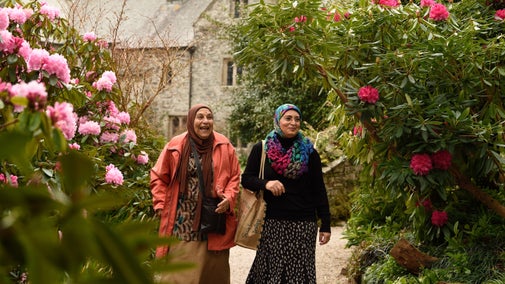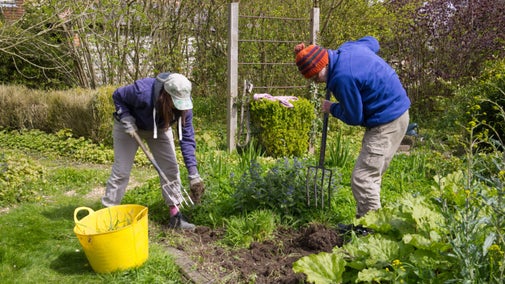
Discover more at Lacock Abbey and the Fox Talbot Museum
Find out when Lacock Abbey and the Fox Talbot Museum are open, how to get here, the things to see and do and more.

There have been gardens at Lacock Abbey for nearly 900 years. Each new owner has refashioned the grounds, from the herb and vegetable gardens that supplied medieval nuns to the pleasure grounds of a fashionable 18th-century gentleman. Now the grounds are a place for you to relax and be immersed in the scents, sounds and colours of nature.
The nuns of Lacock Abbey would have grown herbs for medicinal as well as culinary purposes. Centuries later, William Henry Fox Talbot built the greenhouses in the Botanic Garden. During autumn the swamp cyprus, or taxodium, planted by Talbot turns a beautiful red-brown colour before dropping its leaves.

The romantic Woodland Garden is at its best in the spring before the leaf canopy of the trees blocks out the light to spring bulbs and flowers. You’ll find snowdrops, aconites, anemones, daffodils, snakeshead fritillaries and one of the best displays of Crocus vernus in the country. Autumn colour is dotted around with bright yellows from the gingko and wingnut, and shiny copper leaves of the sweet chestnut.
This peaceful spot with its mix of old and new apple trees is a haven for wild flowers in the spring. Choose your spot for a picnic, lie back and listen to the bees.
Lady Elizabeth’s Rose Garden is planted with varieties she would have known, such as the ramblers 'Alberic Barbier' and 'François Juranville', and shrub roses 'Alba Maxima', 'Maiden's Blush', 'Penelope' and 'Jacques Cartier'.

Where the Woodland Walk meets the Bide Brook you’ll find the Rockworks, an 18th-century conceit. The structure was built to look like the ruin of a Roman or Greek building, faced with limestone intended to look like volcanic tufa.
The hot south-facing walls of the Abbey are the perfect home for plants from Mediterranean climates, many of which have aromatic foliage, such as lavender, santolina, artemisia, rosemary, thyme, southernwood, Russian sage and myrtle.
When the cloister is open for the season, walk through to the damp north-facing wall where you will find a collection of ferns with their fine foliage.
In the spring and summer months, stroll through the mown paths of the parkland, which in the 18th century was part of a fantastic water garden with wide paths and views to and from the Abbey. Today, only the pond remains. In spring make your way through yellow sea of buttercups, giving way to the long grasses of summer, and find the sun sculpture in the centre.
The parkland is closed for winter due to the potential for flooding.
If you spot a plant during your visit that you don't recognise, our garden team are happy to help. Why not send us an email at lacock@nationaltrust.org.uk?
Be sure to describe where you saw it, what it looked like and include a photo if you can and we will let you know what it is.

Find out when Lacock Abbey and the Fox Talbot Museum are open, how to get here, the things to see and do and more.
Explore the historic streets of Lacock, a quintessential English village with timber-framed cottages and local shops. With its central grid of four streets, Lacock today looks much as it did 200 years ago.

Dogs are welcome at Lacock Abbey. Discover where you can go with your dog, what facilities are available for them and how to get the most from your visit.

Seasonal blooms, activity trails, medieval architecture and photographic discovery: have a fun-filled adventure at Lacock Abbey. Watch the gardens change with the seasons and autumn colour come to life in the Woodland, and discover the nature and enjoy crafts and trail activities in October half term. Explore the abbey rooms and discover the window with a unique link to the invention of photography, find out more in the Fox Talbot Museum and feel inspired by the latest exhibition.

The Stables café and Courtyard Tea-rooms are ready to welcome you for refreshments, while the High Street Shop stocks a wide range of gifts and souvenirs.

Learn about the history of photography at the Fox Talbot Museum, with a collection spanning photographic developments up to the present day.

From 18th-century water gardens and Arts and Crafts landscapes to intimate woodland gardens, there are so many places to discover.

Discover our gardeners’ top tips so you can make the most of your garden, plot or window box.

There's plenty of inspiration to be found in gardens and parks near you. Get outdoors and explore a few favourite Wiltshire gardens with all the family.
